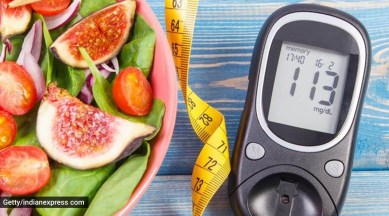📣 For more lifestyle news, click here to join our WhatsApp Channel and also follow us on Instagram
Decoding the ‘5-a-day mix’ guideline of fruits and vegetables for better health
Many fruits and vegetables have high water content, which helps keep the body hydrated, said Dt Aarti Nath, clinical dietician and nutritionist, Paras Health, Udaipur

Including more fruits and vegetables in your diet is beneficial to your health in several ways. Fruits and vegetables are gifted with high quantities of dietary fibre and are naturally low in energy (calories), sodium, and fats which help you to maintain a healthier weight. As such, it is no surprise that the combination of a variety of fruits and vegetables in a day can help your health goals. In fact, there is the “5-a-day mix” dietary recommendation of consuming at least five servings of fruits and vegetables each day which is touted to be beneficial for health. Did you know about that?
The 5-a-day mix guideline is provided by various health organisations, such as the World Health Organization (WHO) and the Centers for Disease Control and Prevention (CDC), to promote a healthy and balanced diet.
monthly limit of free stories.
with an Express account.
What is it?
A diet consisting of five portions of a variety of fruits and vegetables a day (a 5-a-day mix of fruits and vegetables), will give your body most of the essential nutrients required to maintain overall long-term health and also leave you looking and feeling better, said Pavithra N Raj, chief dietician, Manipal Hospital, Yeshwanthpur, Bangalore.
“It’s important to note that the 5-a-day guideline is a general recommendation, and individual needs may vary. It’s always beneficial to consume a diverse range of fruits and vegetables to ensure you’re getting a wide array of nutrients,” said Dt Aarti Nath, clinical dietician and nutritionist, Paras Health, Udaipur.
According to Nath, here are some of the benefits of the mix.
Nutrient-rich: Fruits and vegetables are packed with essential vitamins, minerals, and antioxidants. They provide nutrients like vitamin C, vitamin A, potassium, folate, and fibre, among others. These nutrients are crucial for maintaining good health and preventing various diseases.
Disease prevention: A diet rich in fruits and vegetables has been associated with a reduced risk of chronic diseases, including heart disease, stroke, certain types of cancer, and obesity. The antioxidants present in fruits and vegetables help protect against cellular damage caused by harmful free radicals.
Fibre content: Fruits and vegetables are excellent sources of dietary fibre, which is important for maintaining a healthy digestive system. Fibre helps regulate bowel movements, prevents constipation, and can contribute to weight management by providing a feeling of fullness.
Hydration and weight management: Many fruits and vegetables have high water content, which helps keep the body hydrated. Additionally, they are generally low in calories and fat while being high in fibre, making them an excellent choice for weight management and maintaining healthy body weight.
Overall health and well-being: Incorporating a variety of fruits and vegetables into your diet can contribute to overall health and well-being. They provide essential nutrients for energy, support immune function, and promote healthy skin, hair, and nails.
Raj, too, agreed and listed some other health benefits, including a delay in the development of age-related macular degeneration and cataracts, reducing the symptoms of asthma, improved digestive health, better management of diabetes, and the potential for improved bone health because they are full of water to help hydrate tissues and lubricate joints.
How much is preferable?
According to Pavithra, it is advisable to eat more of all seasonal fruits (2-3 servings of fruits – up to 300gm) and vegetables (4-5 servings of vegetables – up to 500gm) with preferably one green vegetable. “This helps fulfil the vitamin, mineral, and antioxidant requirements of the day and helps your body to detoxify and regenerate,” said Pavithra.
How to consume?
You can consume these fresh foods in any form you like – fresh, frozen, dried, canned fruit, and vegetables. “But go with the seasonal ones because of the climate condition and the natural availability of it. However, it is advised to eat dry fruits in moderation and avoid eating in larger quantities as they contain a concentrated source of sugar that can increase your calories,” Pavithra noted.
📣 For more lifestyle news, follow us on Instagram | Twitter | Facebook and don’t miss out on the latest updates!
📣 For more lifestyle news, click here to join our WhatsApp Channel and also follow us on Instagram